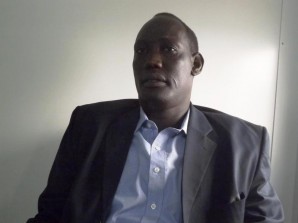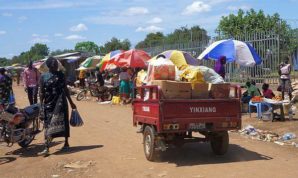 (JUBA SOUTH SUDAN) The ongoing conflict in South Sudan has paralyzed the economy, investors fled, projects stall, supplies cut, markets are burnt down and oil exploitation dropped by 32 percent.
(JUBA SOUTH SUDAN) The ongoing conflict in South Sudan has paralyzed the economy, investors fled, projects stall, supplies cut, markets are burnt down and oil exploitation dropped by 32 percent.
David Ochan, Secretary General of the South Sudan General Business Union said that the private sector in south Sudan is vacant. “The private sector was at hands of foreigners, but they have all fled amid escalating violence” Ochan said.
Ochan said that ninety percent of the investors in South Sudan were foreigners and they fled amid the conflict. Ochan said that the foreign investors left the markets empty. Ochan said that some of the local investors who did not flee were forced to camps, as their shops were looted and burnt behind.
“There no single shop left in Unity, Upper Nile and Jonglei state” Ochan said. “We had a business toured Unity, Upper Nile and Jonglei, but did see any shop left, everything was looted and burnt down” Ochan added.
Ochan said the business union has formed Private sector emergency respond committee to meet the Market demand in the absence of the foreign investors. “The emergency responds committee is task to supply food, fuel and building material to close the vacuum in the affected areas” Ochan was quoted.
He said that the business union is working to ensure that the affected traders get compensation from the government. “The union will give recommendation to the businessmen who lost their businesses amid conflict, so that they get compensation from the government” he said.
Sarah Poni 29, a cake producer and saleslady said that the market in Juba has fallen by forty percent. “The market in general has fallen as many people fled the country and others remain in refugee camps” Poni said.
Poni said she has cut down cake production by 40 percent due to the fall on demand. “I could sell up to ninety pounds a day, but it has dropped to sixty pounds a day” Poni reiterated.
She said most of the consumers fled as suppliers halt supply. There are no materials and there is no market. She said that the market is on standstill.
Janet Chandiru 43, a vegetable seller in Yei County, Central Equatoria State has cried over increased roads blocks following the ongoing insecurity.
The government has established more road blocks to monitor the security. And these blocks turn to collect custom charges. Chandiru said the charges have tripled the fee they pay before the conflict spared. “We don’t know why these block are put, but we are subjected to pay fee in any of the road blocks” Chandiru said.
“We are just trying to push to enable us pay our children in school and provide food” Chandiru said. Joseph Lemi, a Sorghum seller said that business has lost its definition at the current moment. “We are now providing services only without making any profit”. Lemi said.
He said the market has dropped by more than 50 percent. “We are selling to keep our customers in place, otherwise we are not making profit at this time” Lemi said.
Lemi said that increase on custom charges, displacement of the people and reduction on cash flow has affected business in the country.
Eva Anita 38, a vegetable seller in Customs Market in Juba has said that she can’t afford to import more vegetables because of the increase in dollar rate.
South Sudan depends on vegetable imported from neighboring Uganda and dollar is the medium of exchange, but Anita said increase of dollar price against the local currency has restrained their operation.
“It’s hard to get small profit in this business as the dollar has increased against South Sudan pounds” Anita said. “We only use dollar to purchase goods from Uganda” Anita added.
She said that now (1) dollar is (4.8) pounds which is doubling the actual price. Actually before the crisis began last December, one dollar use to be at (2.9) pounds.
She said that traders are the most people affected by the ongoing conflict. “We are paying heavy rent fee when their no market as conflict continue and people still keep in UN camps” Anita said.
The conflict that broke off in Juba, December 15th and widespread across South Sudan had destructive impact on the oil exploitation.
The violence extended to oil rich states of Unity and Upper Nile, as fighters target to control the oil fields. And resulted in to shutdown of oil flow in Unity State and some parts of Upper Nile state, as oil workers are evacuate the area.
The government of South Sudan 98 percent depend on oil revenue, so the oil shutdown will lower government earns and may lead to another declaration austerity measures.
The Minister of petroleum Mr. Stephen Dhieu said oil exploitation to drop by 32 percent. The government South Sudan oil production output currently stands at 165, 000 burials per day, compared 245,000 burials per day in December 2013 before the crisis” Nicodemus Ajak Bior statement in a press statement.
Ajak said the oil production has dropped by 32 percent. Ajak stated that the oil production in Upper Nile is progressing normal with an out of 165, 000 per day of Dar blend from 2200,000 before outbreak out conflict December 15th 2013.
He said that the drop and fluctuation in production figures is caused due to operational and material supply challenges. However the minister of Foreign Affairs Dr. Barnaba Marial confirmed that South Sudan has lost US$400 million in two months time.
Marial said government large projects stall amid escalating conflict. Marial said the projects include the construction of railway line to connect South Sudan to the India Ocean through Port Mombasa in Kenya.
He said that the country leading source of revenue “oil” flow dropped by over 32 percent. Zachariah Akol, an economic analyst at Sudd institute said that the government may get it hard to meet its operation cost, fund developmental projects or pay staff salaries if the oil is completely shutdown.
“If the oil is shut again, then the government will not be able to deliver basic services to the citizens and will not be able to even pay salaries on time” Akol said.
“Oil is the biggest source of revenue for the government of south Sudan, so any interruption of the oil flow will take the country back to austerity” Akol. Akol said the government has already lost revenue from the private sector following massive looting and burn of markets across the country.
“The private sector is broken down; there is no shop in Jonglei, Upper Nile, Mayom and Unity state” Akol. Akol said all shops and market were burnt amid escalating violence and that suppliers halt supply at the main time.
“The private sector was brought to square one” Akol. Akol said the current atmosphere can’t allow investors to risk their funds. “I am not convinced that investors will risk investing in South Sudan at this time” Akol said.
Akol said the climate is not friendly to investors anymore. “There no enough laws that protect investors and there are no infrastructures in place to attract investors” Akol said. Akol said investors need security, laws that protect their investments and access to markets across the country.
Meanwhile Simon Juma 25, a tailor in Juba market said that despite few businesses open in Juba, the market remained poor. Juma said that the market is poor because their no money in circulation. “The close of the Airport, main roads and markets had negatively affected the market” Juma affirmed.
 He said many employees went without salaries. Juma said that business has gone down since the violence broke last year. He said that buyers fled the situation. “Many people still remained in United Nations Compounds, Internal Displaced camps, as hundreds of thousands fled to neighboring countries” Juma said. He said that South Sudan which was center for business to Uganda, Kenya and Sudan is paralyzed by the ongoing conflict.
He said many employees went without salaries. Juma said that business has gone down since the violence broke last year. He said that buyers fled the situation. “Many people still remained in United Nations Compounds, Internal Displaced camps, as hundreds of thousands fled to neighboring countries” Juma said. He said that South Sudan which was center for business to Uganda, Kenya and Sudan is paralyzed by the ongoing conflict.
